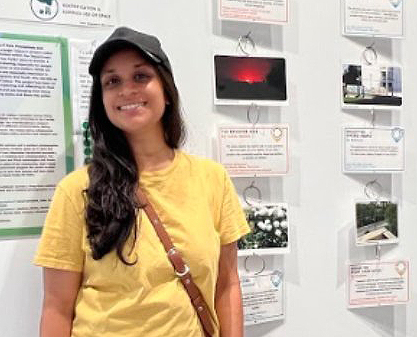
Toronto greenspaces create structural and systemic barriers for racialized residents
More than 200 photos and videos document resident experiences and perceptions on issues, such as access
TORONTO, Aug. 9, 2022 – Racialized residents could face structural and systemic barriers to accessing, using and navigating Toronto’s greenspaces, say the authors of a new report led by York University.
The report, Park Perceptions and Racialized Realities: Exploring the experiences of racialized residents in two Toronto neighbourhoods, offers several recommendations toward making the city’s public greenspaces more welcoming to racialized and Black, Indigenous and People of Colour.

York PhD Candidate Nadha Hassen led the participatory research project with Professor Sarah Flicker, both of the Faculty of Environmental and Urban Change, in collaboration with Greenchange, Jane/Finch Centre and the St. James Town Community Co-operative.
The report will launch on Friday, Aug. 12, at an exhibit of photographs by 18 racialized residents and photographers from either the Jane and Finch or St. James Town areas who participated in the project. The event will take place from 6 to 7:30 p.m. at Corner Commons, Jane-Finch Mall Parking Lot, 1911 Finch Ave. W., Toronto.
The photographers took photos with a view to access, safety, health and well-being across various Toronto greenspaces identifying structural and systemic barriers to accessing and navigating the spaces.
“Together, we collected more than 200 photos and videos documenting resident experiences and capturing perceptions on issues like access, safety, inclusivity, and mental health and well-being,” says Hassen. “There were more than 55 online discussions to debrief those experiences and share perspectives on what it means to navigate and use public greenspaces in Toronto as racialized people.”
Some of the other key themes include belonging and social connection; exclusion; right to play and children’s recreation; maintenance inequities; and gentrification and complex use of space.

“Discussions about greenspaces were an entry point to examining broader issues and barriers faced by racialized residents,” says Flicker, York research chair in community-based participatory research. “Many of the experiences transcend the two represented neighbourhoods as they are common to others living in underserved, marginalized and racialized neighbourhoods across Toronto.”
The communities of Jane and Finch and St. James Town are extremely diverse and are home to many low-income racialized newcomers from various parts of the world. Resident photographers from both communities shared how greenspaces in their neighbourhoods can enable people of all races, ages and diverse backgrounds to have fun and interact, while providing opportunities for connection, enjoyment, peace, mental relief and belonging.
At the same time, they describe experiences of unspoken racism, prejudice, stigmatization and lack of safety, as well as barriers to inclusion and feeling like they don’t belong.
Key recommendations identified by residents include:
• Prioritizing equitable access to high-quality greenspaces in racialized neighbourhoods
• Ensuring the inclusion and maintenance of amenities that racialized residents are asking for
• Directing resources equitably
• Ensuring accountability by evaluating and tracking greenspace changes
• Winterizing outdoor public greenspaces and creating more free indoor community spaces that can be accessed during the cold season
• Improving safety for all, particularly for racialized women
-30-
York University is a modern, multi-campus, urban university located in Toronto, Ontario. Backed by a diverse group of students, faculty, staff, alumni and partners, we bring a uniquely global perspective to help solve societal challenges, drive positive change and prepare our students for success. York's fully bilingual Glendon Campus is home to Southern Ontario's Centre of Excellence for French Language and Bilingual Postsecondary Education. York’s campuses in Costa Rica and India offer students exceptional transnational learning opportunities and innovative programs. Together, we can make things right for our communities, our planet, and our future.
Media Contact:
Sandra McLean, York University Media Relations, 416-272-6317, sandramc@yorku.ca






